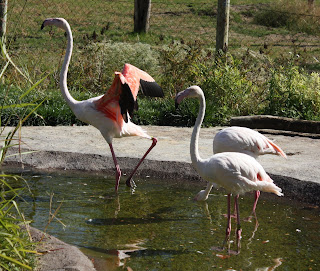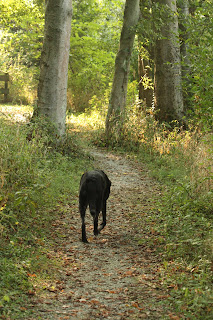First up was this cute little Eastern Screech-owl, named Van Gogh because he only has one ear. Actually, he does have two ears; what we call "ears" are really only tufts of feathers. He is not a baby, he is a 3 year old adult. I never heard what happened to the feathers on the left side of his head. And no, we couldn't touch him.
 Next was a Dwarf Rex rabbit. A Rex has fur like a chinchilla - all soft, downy undercoat, no outer guard hairs. Very soft!
Next was a Dwarf Rex rabbit. A Rex has fur like a chinchilla - all soft, downy undercoat, no outer guard hairs. Very soft! Some people got the shivers when the next animal was brought out to us - this little American Alligator. Isn't he the cutest?
Some people got the shivers when the next animal was brought out to us - this little American Alligator. Isn't he the cutest? I liked him so much I had to include this close-up of his "smile."
I liked him so much I had to include this close-up of his "smile." Finally, what I considered to be the coolest of the four critters - this armadillo.
Finally, what I considered to be the coolest of the four critters - this armadillo. It looked just like a pillbug, all curled up so tightly. I would have loved to have held it. Even better would have been for her to put it down, so I could watch it trundle around the room.
It looked just like a pillbug, all curled up so tightly. I would have loved to have held it. Even better would have been for her to put it down, so I could watch it trundle around the room.As the party was winding down, I took the opportunity to wander around the zoo a little. I saw these flamingos outside on one side of the building which houses the Treetops party room
 and got these Impressionist-style photos of the koi in the pond on the other side of the building.
and got these Impressionist-style photos of the koi in the pond on the other side of the building.

 The sign said that Kookaburras are members of the kingfisher family. When I read that, I thought, "Of course - that big head and huge bill are typical of kingfishers. Why hadn't I noticed that before?"
The sign said that Kookaburras are members of the kingfisher family. When I read that, I thought, "Of course - that big head and huge bill are typical of kingfishers. Why hadn't I noticed that before?"
Rhinoceros Hornbill
Trust me, that's what this is. The thing was more flitty than a kinglet. It never sat still - not on land or water.There were more birds in the bird house, plus many more outside as well, but I wanted to end with this Mystery Duck.
 I know it is not one of our native wild species, but couldn't decide if it was an exotic or some sort of hybrid. A "helpful" zoo guest told me, "I'm a duck hunter; that's a Hooded Merganser." I answered, "I'm a birder, and I've never seen a merganser that looked like that."
I know it is not one of our native wild species, but couldn't decide if it was an exotic or some sort of hybrid. A "helpful" zoo guest told me, "I'm a duck hunter; that's a Hooded Merganser." I answered, "I'm a birder, and I've never seen a merganser that looked like that."Anybody got an idea what this might be?
















































